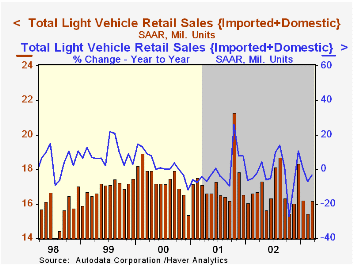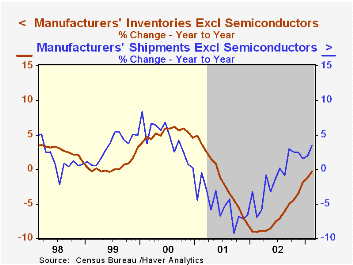 Global| Apr 02 2003
Global| Apr 02 2003U.S. Light Vehicle Sales Better Than Expected
by:Tom Moeller
|in:Economy in Brief
Summary
Unit sales of light vehicles were surprisingly firm in March. Sales rose 4.8% from February and reversed nearly all of that month's m/m decline. Consensus expectations were for a 15.5 mil. unit sales rate. Sales of both light trucks [...]

Unit sales of light vehicles were surprisingly firm in March. Sales rose 4.8% from February and reversed nearly all of that month's m/m decline.
Consensus expectations were for a 15.5 mil. unit sales rate.
Sales of both light trucks and cars rose.
| Light Vehicle Sales (SAAR, Mil.Units) | Mar | Feb | Y/Y | 2002 | 2001 | 2000 |
|---|---|---|---|---|---|---|
| Total | 16.19 | 15.45 | -3.1% | 16.81 | 17.26 | 17.40 |
| Autos | 7.74 | 7.32 | -5.1% | 8.07 | 8.48 | 8.83 |
| Light Trucks | 8.45 | 8.13 | -1.1% | 8.74 | 8.78 | 8.56 |
by Tom Moeller April 2, 2003

The index of mortgage applications compiled by the Mortgage Bankers Association fell 16.8% last week, adding to an 8.8% decline the prior week.
Last week's decline was again led by a sharp decline in applications to refinance which fell 20.3%. The decline lowered applications to refinance by nearly one third from the high.
Refinancing activity represented 73.3% of total applications, down from 76.5% the previous week and down from the high of 80.5%.
Off 5.3%, mortgage applications for home purchase reversed half of the strong gain the week prior. During the last five years there has been a 60% correlation between the y/y change in purchase applications and the change in new plus existing home sales.
The average size of a mortgage loan application fell sharply to $173,000 (-4.4% y/y). The average size of an application for home purchase was $188,900 (+4.0% y/y).
Interest rates on a conventional 30-Year mortgage fell last week and reversed most of the prior week's increase. The contract rate fell to 5.63% from 5.81% and the effective rate (incl. points) fell to 5.93%. The effective rate on a 15-year mortgage fell to 5.23%.
Visit the Mortgage Bankers Association site at http://www.mbaa.org.
| MBA Mortgage Applications (3/16/90=100) | 3/28/03 | 3/21/03 | 2002 | 2001 | 2000 |
|---|---|---|---|---|---|
| Total Market Index | 1,262.5 | 1,520.9 | 799.7 | 625.6 | 322.7 |
| Purchase | 364.7 | 383.7 | 354.7 | 304.9 | 302.7 |
| Refinancing | 6,484.6 | 8,135.7 | 3,388.0 | 2,491.0 | 438.8 |
by Tom Moeller April 2, 2003

Manufacturing inventories rose for the third consecutive month in February by 0.4% and were up 1.1% during the three months.
Finally, accumulation was not limited to the transportation sector. Inventories outside of transportation rose 0.4% following four months of little change.
The gain in factory inventories was not broad based and limited to the metals and wood industries.
Inventory declines continued in several durable goods industries including computers & electronic products (-8.4% y/y), machinery (-5.2% y/y), furniture (-0.2% y/y) and electrical equipment (-7.2% y/y).
Nondurable goods inventories also rose 1.1% (+3.7% y/y) led by a 1.6% surge in petroleum and coal.
Factory shipments fell 1.5% and gave back most of the prior month's 1.9% gain. Excluding transportation, shipments fell 2.0% (3.9% y/y) following a 1.1% January rise.
Factory orders fell 1.5% due to the sharp 1.6% decline in durable goods orders, revised from a 1.2% decline in the advance report.
| Factory Survey (NAICS) | Feb | Jan | Y/Y | 2002 | 2001 | 2000 |
|---|---|---|---|---|---|---|
| Inventories | 0.4% | 0.1% | -0.3% | -1.9% | -8.0% | 4.5% |
| New Orders | -1.5% | 1.7% | 2.6% | -0.8% | -7.2% | 5.2% |
| Shipments | -1.5% | 1.9% | 3.4% | -1.1% | -5.3% | 4.4% |
Tom Moeller
AuthorMore in Author Profile »Prior to joining Haver Analytics in 2000, Mr. Moeller worked as the Economist at Chancellor Capital Management from 1985 to 1999. There, he developed comprehensive economic forecasts and interpreted economic data for equity and fixed income portfolio managers. Also at Chancellor, Mr. Moeller worked as an equity analyst and was responsible for researching and rating companies in the economically sensitive automobile and housing industries for investment in Chancellor’s equity portfolio. Prior to joining Chancellor, Mr. Moeller was an Economist at Citibank from 1979 to 1984. He also analyzed pricing behavior in the metals industry for the Council on Wage and Price Stability in Washington, D.C. In 1999, Mr. Moeller received the award for most accurate forecast from the Forecasters' Club of New York. From 1990 to 1992 he was President of the New York Association for Business Economists. Mr. Moeller earned an M.B.A. in Finance from Fordham University, where he graduated in 1987. He holds a Bachelor of Arts in Economics from George Washington University.






